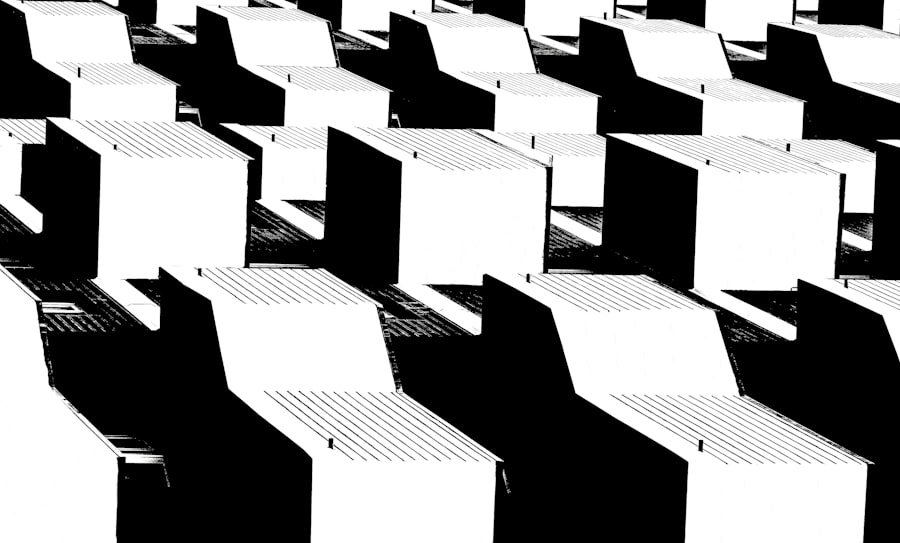Depersonalization and derealization are psychological phenomena that can leave individuals feeling detached from themselves or their surroundings. When you experience depersonalization, you may feel as though you are an observer of your own life, as if you are watching yourself from a distance. This sensation can be unsettling, making you question your own reality and identity.
On the other hand, derealization involves a sense of disconnection from the world around you. You might perceive your environment as dreamlike or distorted, leading to feelings of unreality. Both experiences can occur independently or together, often triggered by stress, trauma, or anxiety.
These phenomena are not uncommon; many people may experience fleeting moments of depersonalization or derealization during particularly stressful times. However, when these feelings become persistent or overwhelming, they can significantly impact your quality of life. Understanding these experiences is crucial for recognizing their effects and seeking appropriate help.
The distinction between the two is essential, as it can guide you in identifying what you are experiencing and how best to address it.
Key Takeaways
- Depersonalization is a feeling of being disconnected from oneself, while derealization is a feeling of being disconnected from the world around you.
- Symptoms of depersonalization and derealization include feeling like you are watching yourself from outside your body, feeling like the world is unreal or distorted, and experiencing emotional numbness.
- Causes of depersonalization and derealization can include trauma, stress, anxiety, and certain mental health disorders.
- Depersonalization and derealization can affect daily life by causing difficulties in relationships, work, and overall functioning.
- Treatment options for depersonalization and derealization may include therapy, medication, and stress-reduction techniques, and seeking help is important for managing these symptoms.
Symptoms of Depersonalization and Derealization
The symptoms of depersonalization and derealization can vary widely from person to person. You might find yourself feeling emotionally numb or disconnected from your thoughts and feelings, which can be particularly distressing. This emotional detachment can lead to difficulties in forming connections with others, as you may feel like a spectator in your own life.
Additionally, you might experience a sense of time distortion, where moments seem to stretch or compress in ways that feel unnatural. In terms of derealization, the symptoms can manifest as a feeling that your surroundings are not real or are somehow altered. You may notice that familiar places appear strange or unfamiliar, leading to confusion and anxiety.
Some individuals report visual distortions, such as objects appearing larger or smaller than they actually are. These symptoms can create a sense of isolation, as you may feel disconnected not only from yourself but also from the world around you.
Causes of Depersonalization and Derealization

The causes of depersonalization and derealization are complex and multifaceted. Often, these experiences are linked to significant stressors or traumatic events in your life. For instance, if you have faced a traumatic experience such as an accident, abuse, or the loss of a loved one, your mind may resort to depersonalization as a coping mechanism.
This dissociative response allows you to distance yourself from the emotional pain associated with the event. Additionally, anxiety and panic disorders can trigger episodes of depersonalization and derealization. When you are overwhelmed by anxiety, your brain may react by creating a sense of detachment to protect itself from perceived threats.
Substance use can also play a role; certain drugs or alcohol can induce feelings of unreality or detachment. Understanding these potential causes is vital for addressing the underlying issues that contribute to these experiences.
How Depersonalization and Derealization Affect Daily Life
| Impact | Effects |
|---|---|
| Emotional Impact | Feelings of detachment, numbness, and emotional blunting |
| Social Impact | Difficulty connecting with others, feeling isolated |
| Work/School Impact | Decreased productivity, difficulty concentrating |
| Physical Impact | Heightened anxiety, panic attacks, and physical symptoms |
| Everyday Activities | Difficulty enjoying hobbies, feeling disconnected from surroundings |
Living with depersonalization and derealization can significantly impact your daily life and overall well-being. You may find it challenging to engage in routine activities or maintain relationships due to the persistent feelings of detachment. Simple tasks like going to work, socializing with friends, or even enjoying hobbies can become daunting when you feel disconnected from yourself or your surroundings.
You might struggle with feelings of loneliness and isolation, as it can be difficult to explain your experiences to others who may not understand what you are going through. This lack of understanding can further exacerbate feelings of alienation, making it essential to seek support from those who can empathize with your situation.
Diagnosing Depersonalization and Derealization
Diagnosing depersonalization and derealization typically involves a comprehensive evaluation by a mental health professional. During this process, the clinician will likely ask about your symptoms, their duration, and any potential triggers you have identified. It is essential to provide detailed information about your experiences so that the clinician can make an accurate assessment.
In some cases, the clinician may use standardized questionnaires or assessments to gauge the severity of your symptoms. They will also consider whether your experiences are part of a broader mental health condition, such as anxiety or depression. A thorough diagnosis is crucial for developing an effective treatment plan tailored to your specific needs.
Treatment Options for Depersonalization and Derealization

Treatment for depersonalization and derealization often involves a combination of therapeutic approaches tailored to your individual needs. Cognitive-behavioral therapy (CBT) is one common method used to help individuals understand and reframe their thoughts related to these experiences. Through CBT, you can learn coping strategies to manage anxiety and reduce the frequency of depersonalization episodes.
In some cases, medication may be prescribed to address underlying mental health conditions contributing to your symptoms. Antidepressants or anti-anxiety medications can help stabilize mood and reduce anxiety levels, which may alleviate feelings of detachment. It is essential to work closely with your healthcare provider to determine the most appropriate treatment options for your situation.
Coping Strategies for Depersonalization and Derealization
In addition to professional treatment, there are several coping strategies you can employ to manage depersonalization and derealization in your daily life. Mindfulness practices, such as meditation or deep breathing exercises, can help ground you in the present moment and reduce feelings of detachment. Engaging in physical activities like yoga or walking can also promote a sense of connection between your mind and body.
Keeping a journal can be another effective way to process your thoughts and emotions related to these experiences. Writing about your feelings can provide insight into triggers and patterns that may contribute to episodes of depersonalization or derealization. Additionally, seeking support from friends, family, or support groups can create a sense of community and understanding that is vital for healing.
The Relationship Between Depersonalization, Derealization, and Mental Health Disorders
Depersonalization and derealization often coexist with various mental health disorders, making it essential to understand their relationship with conditions such as anxiety disorders, depression, and post-traumatic stress disorder (PTSD). When you experience chronic anxiety or trauma-related symptoms, your mind may resort to dissociative mechanisms like depersonalization as a way to cope with overwhelming emotions. Recognizing this connection is crucial for effective treatment.
Addressing the underlying mental health issues through therapy or medication can significantly reduce the frequency and intensity of depersonalization and derealization episodes. By treating both the symptoms and their root causes, you can work towards achieving a more stable emotional state.
Depersonalization and Derealization in Children and Adolescents
Depersonalization and derealization are not limited to adults; children and adolescents can also experience these phenomena. In younger individuals, these feelings may manifest differently than in adults due to their developmental stage and understanding of reality.
It is essential for parents to create an open environment where children feel comfortable discussing their feelings without fear of judgment. If a child exhibits signs of persistent depersonalization or derealization, seeking professional help is crucial for addressing these issues early on. Early intervention can help prevent long-term complications and support healthy emotional development.
The Difference Between Depersonalization, Derealization, and Dissociation
While depersonalization and derealization are often discussed together, they are distinct experiences that fall under the broader umbrella of dissociation. Dissociation refers to a disconnection between thoughts, identity, consciousness, and memory. You might experience dissociation in various forms—depersonalization being one aspect where you feel detached from yourself, while derealization involves feeling disconnected from your environment.
Understanding these differences is important for both individuals experiencing these phenomena and mental health professionals working with them. By recognizing the specific nature of each experience, you can better articulate what you are going through during therapy sessions or discussions with loved ones.
Seeking Help for Depersonalization and Derealization
If you find yourself struggling with persistent feelings of depersonalization or derealization, seeking help is a vital step towards regaining control over your life. Mental health professionals can provide valuable support through therapy and medication options tailored to your needs. Remember that reaching out for help is not a sign of weakness; it is an essential part of taking charge of your mental health.
You deserve to feel connected to yourself and the world around you. By acknowledging your experiences and seeking appropriate support, you can work towards understanding the underlying causes of depersonalization and derealization while developing effective coping strategies for managing these challenges in your daily life.
Depersonalization-derealization disorder is a complex mental health condition characterized by persistent feelings of detachment from one’s body or surroundings, often described as feeling like an outside observer of oneself. For those seeking a deeper understanding of this condition, an insightful article on the topic can be found on Unplugged Psychology’s website. This article delves into the symptoms, causes, and potential treatments for depersonalization-derealization disorder, providing valuable information for both sufferers and those supporting them. To explore this further, you can read the related article by visiting Unplugged Psychology.
Learn More About Depersonalization & Derealization
FAQs
What is depersonalization-derealization disorder?
Depersonalization-derealization disorder is a mental health condition characterized by feeling detached from oneself (depersonalization) and feeling detached from the world around them (derealization). It can be a distressing and disruptive experience for those who suffer from it.
What does depersonalization feel like?
Depersonalization can feel like being an outside observer of one’s own thoughts, feelings, and body. It may also involve feeling like one’s body or actions are not their own, or feeling disconnected from their own identity.
What does derealization feel like?
Derealization can feel like the world around the individual is unreal or distorted. It may involve feeling like the environment is foggy, dreamlike, or artificial, and can lead to a sense of detachment from one’s surroundings.
What are some common symptoms of depersonalization-derealization disorder?
Common symptoms of depersonalization-derealization disorder include feeling detached from oneself, feeling like an outside observer of one’s thoughts and actions, feeling like the world is unreal or distorted, and experiencing emotional numbness.
What can trigger depersonalization-derealization episodes?
Depersonalization-derealization episodes can be triggered by stress, trauma, anxiety, substance abuse, or other mental health conditions. They can also occur spontaneously without an identifiable trigger.
How is depersonalization-derealization disorder diagnosed?
Depersonalization-derealization disorder is diagnosed based on a thorough evaluation by a mental health professional, including a discussion of symptoms, medical history, and ruling out other potential causes. There are no specific tests for this disorder.
What are some treatment options for depersonalization-derealization disorder?
Treatment for depersonalization-derealization disorder may include therapy (such as cognitive-behavioral therapy), medication (such as antidepressants or anti-anxiety medications), stress management techniques, and addressing any underlying mental health conditions. It is important to seek professional help for an accurate diagnosis and appropriate treatment plan.




